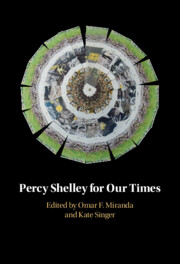Book contents
- Percy Shelley for Our Times
- Reviews
- Percy Shelley for Our Times
- Copyright page
- Contents
- Notes on Contributors
- Acknowledgments
- Abbreviations
- Introduction
- 1 Shelley, Treaty-Making, and Indigenous Poetry
- 2 Waiting for the Revolution
- 3 “A Chamæleonic Race”
- 4 Dream Defenders and the Inside Songs
- 5 Radical Suffering
- 6 Loathsome Sympathy
- 7 Hopeless Romanticism
- 8 Percy Shelley’s Sad Exile
- 9 Shelley in the Overgrowth
- 10 Creatrix Witches, Nonbinary Creatures, and Shelleyan Transmedia
- 11 Action at a Distance
- 12 Educating the Imagination/Defending Shelley Defending
- Further Reading
- Index
12 - Educating the Imagination/Defending Shelley Defending
Published online by Cambridge University Press: 07 March 2024
- Percy Shelley for Our Times
- Reviews
- Percy Shelley for Our Times
- Copyright page
- Contents
- Notes on Contributors
- Acknowledgments
- Abbreviations
- Introduction
- 1 Shelley, Treaty-Making, and Indigenous Poetry
- 2 Waiting for the Revolution
- 3 “A Chamæleonic Race”
- 4 Dream Defenders and the Inside Songs
- 5 Radical Suffering
- 6 Loathsome Sympathy
- 7 Hopeless Romanticism
- 8 Percy Shelley’s Sad Exile
- 9 Shelley in the Overgrowth
- 10 Creatrix Witches, Nonbinary Creatures, and Shelleyan Transmedia
- 11 Action at a Distance
- 12 Educating the Imagination/Defending Shelley Defending
- Further Reading
- Index
Summary
What might Shelley’s A Defence of Poetry teach us about the current crisis of the humanities? This crisis is perpetual at least since Plato banished poets from his Republic. But in our current climate of anti-intellectualism, the crisis feels especially urgent. Or is it? Shelley’s answer was the autonomy of imagination, a creative spirit that sustained liberal notions of what Northrop Frye called an “educated imagination,” the hallmark of civil society. Yet Shelley feared this future might never arrive. Instead of a second half of the Defence, he wrote an elegy on the death of Keats. So, what is our future in a world where the autonomy of imagination has morphed into fake news and alternative facts? Add to this the existential crises of a pandemic and climate change and poetry must not only reimagine the world but justify its capacity to do so. This latter necessity defines a neoliberal academy in which the humanities, precisely because historically they have questioned being instrumentalized, need to make themselves ever more relevant or perish altogether. This chapter asks what hope might be created from contemplating that possible wreck, and thus what it means to educate our imaginations in perilous times.
- Type
- Chapter
- Information
- Percy Shelley for Our Times , pp. 260 - 275Publisher: Cambridge University PressPrint publication year: 2024

